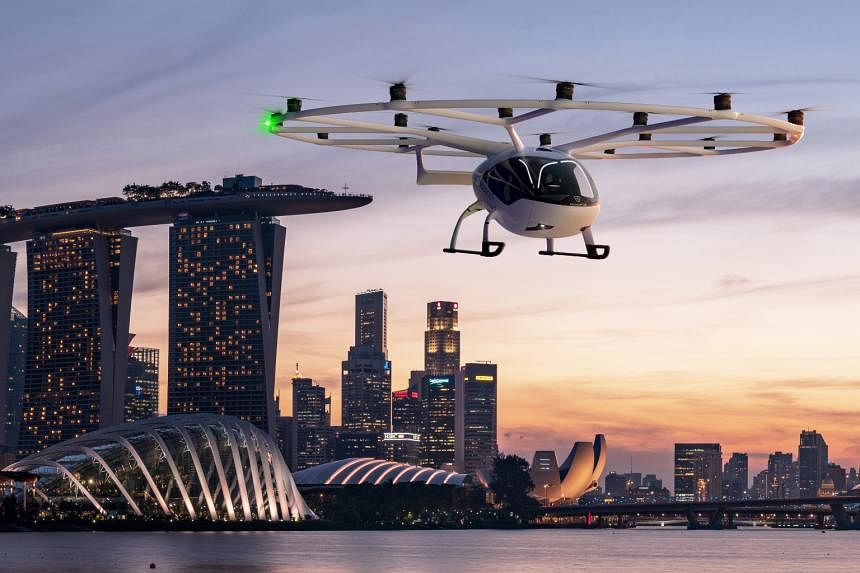SINGAPORE - Aviation authorities here will work more closely with their European counterparts to make widespread unmanned drone use and flying taxis a reality.
This comes after Civil Aviation Authority of Singapore (CAAS) on Tuesday signed an agreement with European Union Aviation Safety Agency (EASA) to collaborate on areas such as personnel training and safety regulations.
The agreement is the first such transnational agreement on urban air mobility CAAS has signed with a foreign regulatory authority. Through it, both authorities want to make sure certification standards can keep pace with a rapidly developing industry that is expected to be worth $75 billion by 2035 and have operationally ready flying taxis as early as 2024.
Under a memorandum of understanding signed on Tuesday, CAAS and EASA will hammer out safety standards and develop harmonised safety certificates for flying taxis and drones.
They will also discuss strategies on public outreach so that members of the public are more comfortable with this new mode of transport, while co-organising urban air mobility conferences and events to share knowledge.
“In the last few years, we have seen quantum leaps in unmanned aircraft systems and urban air mobility development,” CAAS director-general Han Kok Juan said at Goodwood Park Hotel on Tuesday, where the MOU was signed.
“Deployment and realising their full potential will require the attendant development of regulation, to assure safety and security and to build public confidence and acceptance. We have reached an inflexion point.”
The EU was the first to publish regulation for drones in 2019. In March 2022, it also completed the world’s first guidance for the design of vertiports, structures resembling helipads for air taxis to take off and land.
“We may be the first with these proposals, but we do not want to be first and alone,” said EASA strategy and safety management director Luc Tytgat. “There is a common need to establish international standards... even though most operations will be at a more local level.”
The agreement was signed on the sidelines of the inaugural EU-Asia symposium on unmanned aircraft systems and urban air mobility taking place in Singapore from Tuesday to Friday.
The event has attracted more than 20 civil aviation authorities from Europe and Asia - including India, Vietnam, Cambodia and Nepal - as countries worldwide begin to pay more attention to a burgeoning sector touted to be more environmentally friendly, efficient and safe.
Singapore is expecting its first commercial flying taxi service over Marina Bay as early as 2024, while France is aiming for one to be launched with the Paris Olympics in the same year.
The Republic already signed two agreements with advanced air mobility start-ups Skyports and Volocopter previously that may convert Seletar into an air hub where flying taxis can take off, land, and undergo maintenance.
But not all of urban air mobility is a distant dream. Those participating in the EU-Asia symposium will pay a visit to the Maritime Drone Estate in Marina South Pier over these four days, where commercial trials of unmanned drones delivering small items to ships out at sea have already been ongoing.
CAAS’ Mr Han said drones and air taxis have the potential to make the delivery of everyday goods and services cheaper and more convenient, while making maintenance and inspection works of machines safer for workers.
“Urban air mobility will transform the way we live, move and work,” he said.


